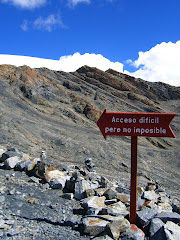Click Title for an Interesting Article.
My family is good friends with a guy who runs a foundation, the foundation of a prominent natural foods store. He was in the Peace Corps with my parents in the 1970's and he is sort of like my godfather, or maybe he would be if he were Christian but that's beside the point. He is interested in development, is a Libertarian, is really, really into free market-ness, and loves to have heated discussions about it at Mexican restaurants with margaritas. You know the type ;) (Maybe you've met me? Except for that Libertarian business-eww.) He sent me this article that I appreciated. Maybe you will too. I don't subscribe to the Wall Street Journal so I can't post a link to Wall Street's site, but here's the text in Word.
I think it is poignant because it paints such an accurate picture of what I have seen here in Peru with regard to the economics of daily life. In Rinconada they used to pay 8 soles a week for electricity. Then electricity was privatized, they put in electric meters and the cost went way down. I pay between 5 and 6 soles a month for electricity (less than $2) to a private company. In the nearby provincial capital they privatized the water and the same thing happened: major cost reduction. So, folks in Rinconada are trying to privatize their water too and are in the process of putting in meters.
The thing about Internet in this article is also true where I live. Folks have Internet cafes but houses do not have bathrooms. They just go out to the corral where they keep the animals. That is a little more complicated in Rinconada than the article makes it sound because there is a waste water system, but people do not seem to be interested in connecting their houses to it. I don't completely understand, but I think it's something like, "We haven't ever had a toilet before. Why would we want to spend 500 soles to put in a bathroom now?" 500 soles is a lot of money here. I'm not always super excited about stuff I read from Cato but this is pretty interesting. What do you think?
One of the jokes about Peace Corps volunteers that runs around the Lima office is how volunteers enter all bleeding hearted and perfectly nice liberals and leave as Republicans. I frankly doubt it, but hey who knows?
Monday, August 20, 2007
Privatization. I find myself a fan.
at 3:19 PM
Subscribe to:
Post Comments (Atom)

4 comments:
Ella - my name is John Hutcheson. My daughter is Erin, who is also a Peace Corps volunteer in Peru. She was in Lima at the time of the earthquake, but seems to have weathered it just fine (along with the other volunteers there).
Just curious, do you know Erin? Enjoying reading your blog..thanks!
Hi John,
Thanks for reading!
I'm glad to hear that Erin is safe. I haven't met her but I think that she's friends with my friend Amanda. She got to Peru a bit before I did and I think lives down in Ancash so we don't cross paths much.
Yea all Peace Corps people in Peru are safe and fine, even the 5 who live in Ica nearest the epicenter. Apparently they were in Ica for training when it hit. They went back last week and I haven't heard anything about their houses... I hope their communities were not too badly damaged.
Hi Ella,
I liked your description of me. But I think a Buddhist-Taoist-Esoteric Christian-Hindu Animist-Sufi-Gnostic can be a godfather. I am Sicilian ex-Catholic, after all, but I will have to check on that.
You may not leave the PC a Republican, but maybe a bit more libertarian in the sense you may find yourself liberal on social issues, but conservative on fiscal, government involvement/states rights issues. BTW, I've never voted for a Republican and darn few Democrats, the last one being Carter in 1976.
Oh good. I didn't know the god-paternity rules for Buddhist-Taoist-Esoteric Christian-Hindu Animist-Sufi-Gnostic Sicilian ex-Catholic godfathers. I'm glad to hear that you're in agreement :)
Here's the problem for me with Libertarians and their version of fiscal responsibility. It means not spending money on poverty band-aid programs, like health care for the poor, food aid, welfare, etc... I know that this is an unpopular position fromall sides, but the thing is that sometimes all folks need is a band-aid to get them through. For me the key example of this came after working at Riker's Island. NYC jails cannot, try as they might, cannot escape the horrible health care access for poor men, especially men of color in the Bronx. Jail is their main health care provider. Peru has an interesting but not all encompassing public health care model... So I feel like the health care question is up for debate.
Post a Comment